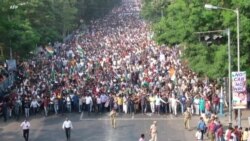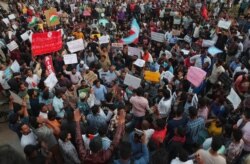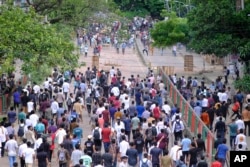Student Union
Indian Students Decry Police as Citizenship Protests Grow
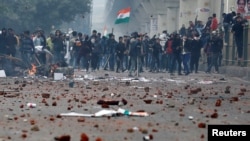
Indian student protests that turned into violent clashes with police galvanized nationwide opposition on Tuesday to a new law that provides a path to citizenship for non-Muslim migrants who entered the country illegally from several neighboring countries.
Police fired tear gas in the Seelampur area of New Delhi to push back protesters who burned a police booth and two motorbikes after throwing stones and swarming barricades.
Roads leading to the Muslim-majority neighborhood were strewn with stones, tear gas canisters and shards of broken glass.
"We are protesting against the new citizenship law. They are saying if you don't have any proof (of citizenship) they will send us out of India," said 15-year-old Mohammad Shehzad.
Protests against the law were also reported in the states of West Bengal, Kerala, Karnataka and elsewhere. On Sunday, a march by students at New Delhi's Jamia Millia Islamia University descended into chaos when demonstrators set three buses on fire. Police responded with rubber bullets and tear gas. Videos showed officers running after unarmed protesters and beating them with wooden sticks.
Hanjala Mojibi, an English major at the predominantly Muslim school, said that when he and others saw police enter the campus, they walked toward them with their hands up to indicate their protest was nonviolent.
"The police made all 15 of us kneel and started beating us. They used lots of abusive words. One of them removed my prescription glasses, threw (them) on the ground, broke them and told me to look down," Mojibi said at a news conference in tears.
Simultaneously on Sunday, police stormed Aligarh Muslim University in the north Indian state of Uttar Pradesh firing tear gas and injuring five people who were participating in a student-led demonstration, university spokesman Rahat Abrar said.
Shahid Hussain, a 25-year-old history major, said police broke the windows of his dormitory and lobbed a tear gas canister inside. He said after fleeing the building to escape the fumes, police pushed him against a tree and beat him with sticks.
Police spokesman Sunil Bainsla denied the account, calling the allegations of police brutality "lies."
The police response to Sunday's protests has drawn widespread condemnation. It also has sparked a broader movement against the Citizenship Amendment Act, with demonstrations erupting across the country.
The new law applies to Hindus, Christians and other religious minorities who are in India illegally but can demonstrate religious persecution in Muslim-majority Bangladesh, Pakistan and Afghanistan. It does not apply to Muslims.
Prime Minister Narendra Modi's ruling Hindu nationalist Bharatiya Janata Party has described the law as a humanitarian gesture.
While it was being debated in Parliament last week, Home Minister Amit Shah said it was "not even .001% against minorities. It is against infiltrators." Modi told an election rally in eastern Jharkhand state on Tuesday that no Indian citizen would be affected by the law. Speaking about Sunday's protests, he accused the opposition Congress party of using students for political purposes.
"The decisions made by the government should be discussed and any voice should be raised in a democratic manner. This government understands your concerns but some people use your shoulder for firing a gun," he said. "I dare Congress, its friends, to publicly declare they are prepared to accord Indian citizenship to all Pakistanis."
Congress party chief Sonia Gandhi met President Ram Nath Kovind as the head of an opposition delegation and asked that the citizenship law be withdrawn.
Talking to reporters, Gandhi said she fears "the situation may spread further."
"I think you all have seen that the Modi government seems to have no compassion when it comes to shutting down people's voices and implementing legislation," she said. Critics of the government say the law is intended to help the ruling party transform a multicultural and secular India into a Hindu "rastra," or distinctly Hindu state and further marginalize India's 200 million Muslims.
India is 80% Hindu and 14% Muslim, which means it has one of the largest Muslim populations of any country in the world.
Police spokesman M.S. Randhawa said 10 people were arrested during Sunday's protest at Jamia Millia Islamia University from Jamia Nagar, a Muslim neighborhood near the university.
"We found out that the arrested men had instigated the crowds and were also responsible for vandalizing public property," Randhawa said.
Students said police lobbed tear gas shells inside the campus, broke down the doors of the library and yanked students out to assault them. Dozens of students were taken to hospitals for treatment.
Police have denied the allegations and said they acted with restraint.
The citizenship law follows a contentious citizenship registry process in northeastern India's Assam state intended to weed out people who immigrated to the country illegally.
Nearly 2 million people in Assam were excluded from the list, about half Hindu and half Muslim, and have been asked to prove their citizenship or else be considered foreign. India is constructing a detention center for some of the tens of thousands of people the courts are expected to ultimately determine came to the country illegally.
Home Minister Shah has pledged to roll it out the program nationwide, promising to rid India of "infiltrators."
The Citizenship Amendment Act could provide protection and a fast track to naturalization for many of the Hindus left off Assam's citizenship list, while explicitly leaving out Muslims.
The backlash to the law came as an unprecedented crackdown continued in Kashmir, India's only Muslim-majority area, which was stripped of special constitutional protections and its statehood in August. Since then, movement and communications have been restricted.
"Our country is not just for Hindus," said Chanda Yadav, 20, a Hindi literature student who was participating in a sit-in Monday at Jamia Millia Islamia University. "I feel it is my moral right to protest against something which divides us as a community."
See all News Updates of the Day
Tips for first-year international students in the US
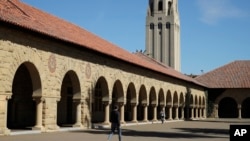
Book your flights right away, get a U.S. phone plan, make sure you have linens for your dorm and attend orientation – that’s some of the advice international students have for first-year college students coming from abroad.
U.S. News & World Report compiled helpful tips for students studying in the United States for the first time. (July 2024)
Survey: Social integration, career prep are important to international students
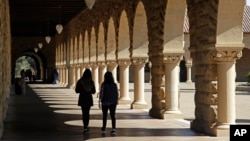
A recent survey of international students in the United States found that before starting school, they were concerned about personal safety, making friends and feeling homesick.
Inside Higher Ed reports that international students want specialized orientations, peer connections, career preparation and job placement to help make their college experiences successful. (July 2024)
US advisory council ends Nigeria visit, signs student exchange deal

Members of a U.S. presidential advisory council have approved a student exchange deal between an American college and a Nigerian university as part of the council's effort to strengthen collaboration on education, health, entrepreneurship and development between Africa and Africans living abroad.
The council also visited a health facility supported by the United States Agency for International Development in the capital.
Nigerian authorities and visitors chatted with members of the U.S President's Advisory Council on African Diaspora Engagement as they toured a healthcare facility in Karu, a suburb of Abuja, on the last day of the council's three-day visit to Abuja and Lagos.
The facility is one of many supported by the United States Agency for International Development, or USAID, to improve the management of childhood illnesses, family planning, immunization and delivery.
The tour was part of the council's effort to promote African diaspora-led investments in technology entrepreneurship, education and healthcare delivery.
"They're doing a phenomenal job there, it really gave us a sense of what the healthcare system is in Nigeria," said Deniece Laurent-Mantey, executive director of the advisory council. "This is our first trip as a council to the continent and we chose Nigeria for a reason — the diaspora in Nigeria is very active, very influential, and they're really a source of strength when it comes to our U.S.-Africa policy. And so for us coming to Nigeria was very intentional."
The council was created by President Joe Biden in September to improve collaboration between Africa and its diaspora in terms of economic and social development.
Akila Udoji, manager of the Primary Healthcare Centre of Karu, said officials in Nigeria were pleased that the council members were able to visit.
"We're happy that they have seen what the money they have given to us to work with has been used to do, because they have been able to assist us in capacity-building, trainings, equipment supply and the makeover of the facility," Udoji said.
Earlier, the council signed a deal for a student exchange program between Spelman College in the southern U.S. city of Atlanta and Nigeria's University of Lagos.
Laurent-Mantey said education exchanges are one of the council's top priorities.
"In Lagos, we had the president of Spelman College — she's also a member of our council — she signed an agreement with the University of Lagos to further education exchange programs in STEM and creative industries between those two universities," Laurent-Mantey said. "And I think for us it's very important, because Spelman College is a historically Black university, and so here we are promoting the importance of collaboration between African Americans and Africans."
In March, the advisory council adopted its first set of recommendations for the U.S. president, including the student exchange initiative, advocating for more U.S. government support for Africa, climate-focused initiatives, and improving U.S. visa access for Africans.
The council met with Nigerian health and foreign affairs officials during the visit before leaving the country on Wednesday.
American Academy of the Arts College announces closure
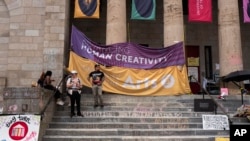
The American Academy of Art College in Chicago announced it would be closing after 101 years of preparing students for careers in art and illustration.
WTTW news reported that like other art colleges, the academy saw enrollment drop after the pandemic, and officials made the decision to close the college last month. (July 2024)
5 killed, dozens injured in clashes over Bangladesh jobs quota system
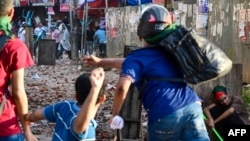
At least 5 people were killed and dozens injured in two separate incidents in Bangladesh as violence continued Tuesday on university campuses in the nation's capital and elsewhere over a government jobs quota system, local media reports said quoting officials.
At least three of the dead were students and one was a pedestrian, the media reports said. Another man who died in Dhaka remained unidentified.
The deaths were reported Tuesday after overnight violence at a public university near Bangladesh's capital, Dhaka. The violence involved members of a pro-government student body and other students, when police fired tear gas and charged the protesters with batons during the clashes, which spread at Jahangir Nagar University in Savar, outside Dhaka, according to students and authorities.
Protesters have been demanding an end to a quota reserved for family members of veterans who fought in Bangladesh's war of independence in 1971, which allows them to take up 30% of governmental jobs.
They argue that quota appointments are discriminatory and should be merit-based. Some said the current system benefits groups supporting Prime Minister Sheikh Hasina. Some Cabinet ministers criticized the protesters, saying they played on students' emotions.
The Bengali-language Prothom Alo daily newspaper reported that one person died in Dhaka and three others, including a pedestrian, were killed after they suffered injuries during violence in Chattogram, a southeastern district, on Tuesday.
Prothom Alo and other media reports also said that a 22-year-old protester died in the northern district of Rangpur.
Details of the casualties could not be confirmed immediately.
While job opportunities have expanded in Bangladesh's private sector, many find government jobs stable and lucrative. Each year, some 3,000 such jobs open up to nearly 400,000 graduates.
Hasina said Tuesday that war veterans — commonly known as "freedom fighters" — should receive the highest respect for their sacrifice in 1971 regardless of their current political ideologies.
"Abandoning the dream of their own life, leaving behind their families, parents and everything, they joined the war with whatever they had," she said during an event at her office in Dhaka.
Protesters gathered in front of the university's official residence of the vice chancellor early Tuesday when violence broke out. Demonstrators accused the Bangladesh Chhatra League, a student wing of Hasina's ruling Awami League party, of attacking their "peaceful protests." According to local media reports, police and the ruling party-backed student wing attacked the protesters.
But Abdullahil Kafi, a senior police official, told the country's leading English-language newspaper Daily Star that they fired tear gas and "blank rounds" as protesters attacked the police. He said up to 15 police officers were injured.
More than 50 people were treated at Enam Medical College Hospital near Jahangir Nagar University as the violence continued for hours, said Ali Bin Solaiman, a medical officer of the hospital. He said at least 30 of them suffered pellet wounds.
On Monday, violence also spread at Dhaka University, the country's leading public university, as clashes gripped the campus in the capital. More than 100 students were injured in the clashes, police said.
On Tuesday, protesters blocked railways and some highways across the country, and in Dhaka, they halted traffic in many areas as they vowed to continue demonstrating until the demands were met.
Local media said police forces were spread across the capital to safeguard the peace.
Swapon, a protester and student at Dhaka University who gave only his first name, said they want the "rational reformation of the quota scheme." He said that after studying for six years, if he can't find a job, "it will cause me and my family to suffer."
Protesters say they are apolitical, but leaders of the ruling parties accused the opposition of using the demonstrations for political gains.
A ruling party-backed student activist, who refused to give his name, told The Associated Press that the protesters with the help of "goons" of the opposition's Bangladesh Nationalist Party and Jamaat-e-Islami party vandalized their rooms at the student dormitories near the Curzon Hall of Dhaka University.
The family-of-the-veterans quota system was halted following a court order after mass student protests in 2018. But last month, Bangladesh's High Court nulled the decision to reinstate the system once more, angering scores of students and triggering protests.
Last week, the Supreme Court suspended the High Court's order for four weeks and the chief justice asked protesting students to return to their classes, saying the court would issue a decision in four weeks.
However, the protests have continued daily, halting traffic in Dhaka.
The quota system also reserves government jobs for women, disabled people and ethnic minority groups, but students have protested against only the veterans system.
Hasina maintained power in an election in January that was again boycotted by the country's main opposition party and its allies due to Hasina's refusal to step down and hand over power to a caretaker government to oversee the election.
Her party favors keeping the quota for the families of the 1971 war heroes after her Awami League party, under the leadership of her father, Sheikh Mujibur Rahman, led the independence war with the help of India. Rahman was assassinated along with most of his family members in a military coup in 1975.




